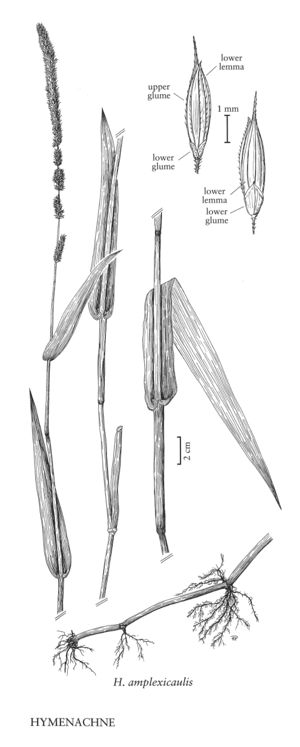Difference between revisions of "Hymenachne amplexicaulis"
FNA>Volume Importer |
FNA>Volume Importer |
||
| Line 17: | Line 17: | ||
-->{{Treatment/Body | -->{{Treatment/Body | ||
|distribution=Puerto Rico;Fla. | |distribution=Puerto Rico;Fla. | ||
| − | |discussion=<p>In the Flora region, | + | |discussion=<p>In the Flora region, Hymenachne amplexicaulis is known only from low, wet pastures in southern Florida and it is rare even in that state. It is more abundant in the remainder of its range which extends through Mexico to Argentina.</p> |
|tables= | |tables= | ||
|references= | |references= | ||
| Line 33: | Line 33: | ||
|basionyms= | |basionyms= | ||
|family=Poaceae | |family=Poaceae | ||
| + | |illustrator=Linda A. Vorobik and Hana Pazdírková | ||
|distribution=Puerto Rico;Fla. | |distribution=Puerto Rico;Fla. | ||
|reference=None | |reference=None | ||
| Line 38: | Line 39: | ||
|publication year= | |publication year= | ||
|special status= | |special status= | ||
| − | |source xml=https:// | + | |source xml=https://bibilujan@bitbucket.org/aafc-mbb/fna-data-curation.git/src/314eb390f968962f596ae85f506b4b3db8683b1b/coarse_grained_fna_xml/V25/V25_1433.xml |
|subfamily=Poaceae subfam. Panicoideae | |subfamily=Poaceae subfam. Panicoideae | ||
|tribe=Poaceae tribe Paniceae | |tribe=Poaceae tribe Paniceae | ||
Revision as of 16:15, 30 October 2019
Plants perennial. Culms to 3.5 m tall, 1 cm or more thick, decumbent. Ligules 1-2.5 mm, brownish; blades 15-33 cm long, 12-28 mm wide, lax, flat, glabrous. Panicles 10-40 cm long, 0.7-1.2 cm thick, spikelike, dense, sometimes lobed near the base; basal branches 1.5-5 cm, strictly erect. Spikelets 3.5-5 mm, lanceolate, acuminate. Lower glumes 1-1.7 mm, 3-veined; upper glumes 2.8-3.9 mm; lower lemmas 3.6-4.6 mm, longer than the upper glumes, attenuate to subaristate; lower paleas absent; upper lemmas 2.5-3.5 mm; anthers 1.1-1.2 mm. 2n = 10.
Distribution
Puerto Rico, Fla.
Discussion
In the Flora region, Hymenachne amplexicaulis is known only from low, wet pastures in southern Florida and it is rare even in that state. It is more abundant in the remainder of its range which extends through Mexico to Argentina.
Selected References
None.
